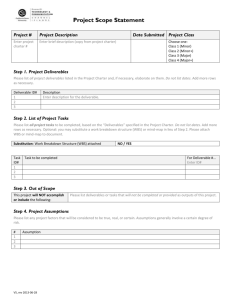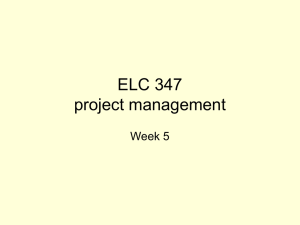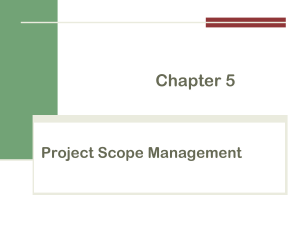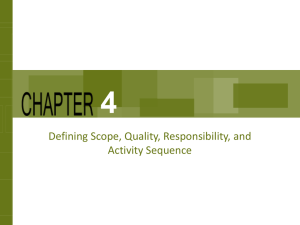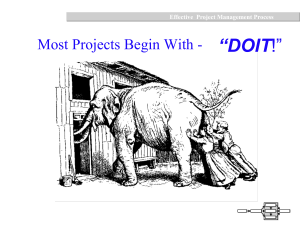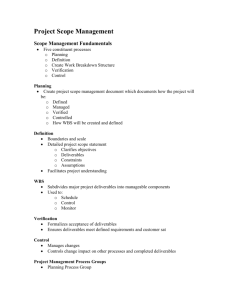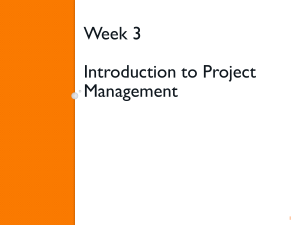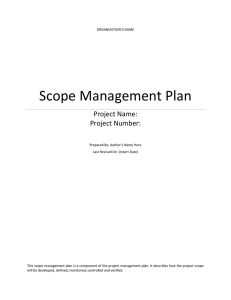Lecture 1 Title: MIS Concept and Definition
advertisement
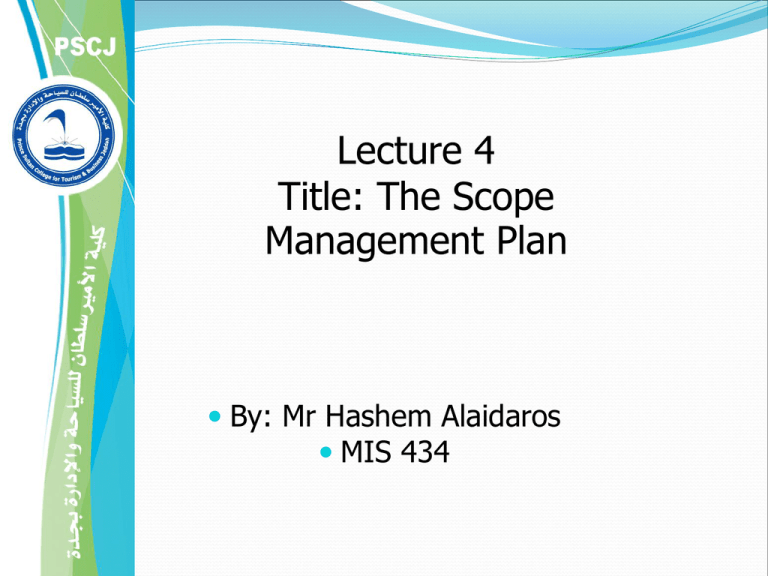
Lecture 4 Title: The Scope Management Plan By: Mr Hashem Alaidaros MIS 434 Main Topics Scope Management: Planning Definition Work Breakdown System Verification Control What is Project Scope Management? Scope refers to all the work involved in creating the products of the project and the processes used to create them. A deliverable is a product produced as part of a project, such as hardware or software, planning documents, or meeting minutes. Project scope management includes the processes involved in defining and controlling what is or is not included in a project. Scope Management Processes Scope Planning Scope Definition Create WBS Documents how the team will define and develop the project’s scope and WBS, as well as processes for verifying and controlling the project and product deliverables. Builds upon the preliminary project scope statement to define all the project and product deliverables, including the processes and criteria for acceptance. A project planning tool that that decomposes or subdivides and organizes the project’s scope into a deliverableorientated hierarchy. Detailed Project Scope Work Breakdown Structure Scope Management Plan Scope Verificatio n A formalized acceptance from the appropriate stakeholders that the defined project scope is complete Scope Verification Checklist Scope Control A defined process for managing changes to project and product scope and the impact of those changes to the project’s schedule and budget. Scope Change Control Process PMBOK Scope Management Processes Scope Management Process Description Scope Planning The development of a scope management plan that defines the project’s scope and how it will be verified and controlled throughout the project. Scope Definition A detailed scope statement that defines what work will and will not be part of the project and will serve as a basis for all future project decisions Create Work Breakdown Structure (WBS) The decomposition or dividing of the major project deliverables into smaller and more manageable components. Scope Verification Confirmation and formal acceptance that the project’s scope is accurate, complete, and supports the project’s MOV. Scope Change Control Ensuring that controls are in place to manage proposed scope changes once the project’s scope is set. These procedures must be communicated to all project stakeholders. 1. Scope Planning Initiating process to begin defining and documenting the project work (i.e., deliverables) needed to achieve the project’s value Extra work that will not help the project achieve it’s value will only needlessly increase the project’s schedule and budget This process begins at a high level and will become more detailed as the project progresses and more information becomes available Attempts to answer the question: What is and what is not to be delivered by this project? Makes the project sponsor’s needs and expectations explicit Tools: Scope Boundary Scope Statement The Scope Boundary “Failure to define what is part of the project, as well as what is not, may result in work being performed that was unnecessary to create the product of the project and thus lead to both schedule and budget overruns.” - Olde Curmudgeon, 1994 (an anonymously written column in PM Network Magazine) Example Scope Statement 1. 2. 3. Develop a proactive electronic commerce banking strategy that identifies the processes, products and services to be delivered through the World Wide Web. Develop an application system that supports all of the processes, products, and services identified in the electronic commerce strategy. The application system must integrate with the bank’s existing enterprise resource planning system. Out of Scope 1. 2. Technology and organizational assessment of the current environment Customer resource management and data mining components 2. Project Scope Definition The scope boundary and scope statement provide a useful first step The project’s scope must now be defined in more detail in terms of specific deliverables that provide a basis for developing the project’s work breakdown structure (WBS) Example Tools: Context Level Data Flow Diagram (Structured Systems Analysis and Design) Use Case Diagram (Object Oriented Systems Analysis and Design) Context Level Data Flow Diagram Use Case Diagram 3. Creating the Work Breakdown Structure (WBS) A WBS is a deliverable-oriented grouping of the work involved in a project that defines the total scope of the project. A WBS is a foundation document that provides the basis for planning and managing project schedules, costs, resources, and changes. Decomposition is subdividing project deliverables into smaller pieces. Developing the WBS A work package is developed for each of the phases and deliverables defined in the Deliverable Structure Chart (DSC) Example Work Breakdown Structure The WBS should follow the Work Package Concept Example Gantt Chart in Microsoft Project 4. Project Scope Verification Measurable Organizational Value (MOV) Has the project’s MOV been clearly defined and agreed upon? Deliverables Are the deliverables tangible and verifiable? Do they support the project’s MOV? Quality Standards Milestones Significant events that mark the acceptance of a deliverable Review and Acceptance Formal Signoff 5. Scope Change Control Concerned with managing changes to the project’s scope and to ensure that these changes are beneficial when they occur Mitigates: Scope Creep Tools/Procedures: Scope Change Request Form Scope Schedule Budget Example of a Scope Change Request Form Example of a Scope Change Request Log Benefits of Scope Control Keeps the project manager in control of the project. Authorized changes to the project’s scope are reflected in changes to the project’s schedule and budget. Allows the project team to stay focused and on track They do not have to perform unnecessary work.
